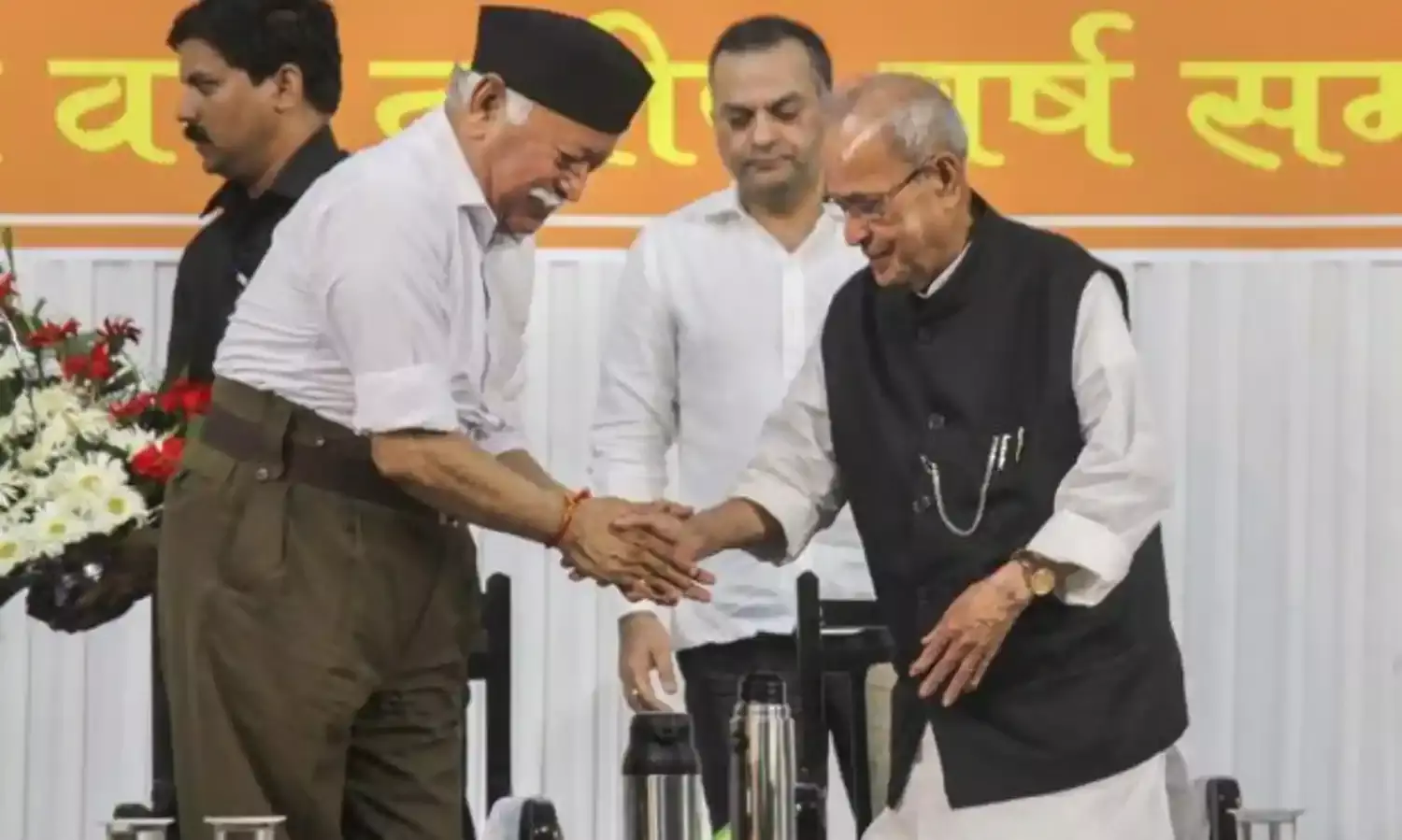Pranab Mukherjee at RSS HQ: Images Speak Louder Than Words
Former President gives RSS legitimacy

Dialogue is a core part of the democratic process. The question thus is: can there be dialogue between two opposing ideologies the one of Indian nationalism and the other of Hindu nationalism?
We witnessed a strange spectacle when former President of India, Pranab Mukherjee, a lifelong Congressman, arrived at the Nagpur headquarters of the Rashtriya Swayamsevak Sangh , the apex organization promoting narrow, divisive, exclusive Hindu nationalism.
The decision of the former President to speak from the RSS platform was strongly opposed by large sections of Congress leaders and many others, on the ground that regardless of what sentiments he spouted the advantage would remain with the RSS.
And that for the RSS it was only about gaining legitimacy from the visit.
Gandhi who was one such visitor received by the RSS in 1947 was killed by its ideology of hate. “All their (RSS) leaders’ speeches were full of communal poison. As a final result the poisonous atmosphere was created in which such a ghastly tragedy (Gandhi’s murder) became possible. RSS men expressed their joy and distributed sweets after Gandhi’s death.” (Sardar Patel’s letter).
So what happened in Nagpur during Pranab Mukherjee’s visit on June 7,2018? To begin with Mukherjee visited RSS founder K B Hedgewar’s birthplace and wrote, “Today I came here to pay my respects & homage to a great son of Mother India KB Hedgewar ji.” Hedgewar guided by his Hindu nationalism called Muslims yavana snakes. Hedgewar-RSS also kept aloof from the freedom movement, which gave us Independence and later the Indian Constitution.
Mukherjee, did not speak of the Muslims and minorities directly but did talk of pluralism and the inclusive nature of the Indian Constitution, India being a meeting ground of different people, “It is our composite culture which makes us into a nation. India’s nationhood is not one language, one religion, one entity.” He advised the RSS swayamsevaks, “You are young, disciplined, well trained and athletic. Please wish for peace, harmony and happiness. Our motherland is asking for that, our motherland deserves that”. And “any attempt at defining our nationhood in terms of dogmas and identities of religion, region, hatred and intolerance will only lead to dilution of our national identity.”
The highlight of his speech was his recalling Surendranath Banerjee for his phrase “Nation in the making” as this phrase aptly defined the emergence of Indian nationalism during the freedom movement, in contrast to the RSS assertion that India is a Hindu nation from times immemorial.
Mukherjee recalled the values of Gandhi and Nehru in trying to understand India’s past and Sardar Patel’s contribution in merging the princely states into India.
Mukherjee toed the line of Indian culture as a synthesis of different streams, “It is our composite culture which makes us into a nation. India’s nationhood is not one language, one religion, one entity.”
And more significantly he pointed out that secularism and pluralism are the soul of India which is constituted by "Perennial Universalism of 1.3 billion people who use more than 122 languages and 1600 dialects, practice seven major religions and belong to three major ethnic groups, who live under one system, one flag and one identity of being Bharatiya.”
The present scenario created due to RSS Hindu nationalism, where hate has been created around emotive issues like Ram Temple, Cow-beef, love jihad needed to be underlined. The direct connection of the present atmosphere of narrowness and intolerance needed to be drawn out. He did not mention the important fact that the current intimidating, sectarian atmosphere which is building up in the country is due to the Hindu nationalist agenda. While he spoke of pluralism and diversity, he failed to mention the political fallout of the RSS agenda that does not respect other opinion.
The contrast between the agenda of two nationalisms, Hindu nationalism and Indian nationalism was not even touched on.
But now after the speech it is more than likely that the RSS will use the speech to create legitimacy for itself. It will be taken as recognition of the RSS as a legitimate organisation, for building the Ram temple after demolishing the Babri mosque, for justifying the issue of cow-beef as ‘nation building.’
Surely, despite a good articulation of Indian nationalism by the ex-President, the likely outcome of the visit has been well described by his daughter, who said, the speech will be forgotten and pictures will remain.
The photographs will be circulated with different content, giving legitimacy to the divisive agenda of RSS.



